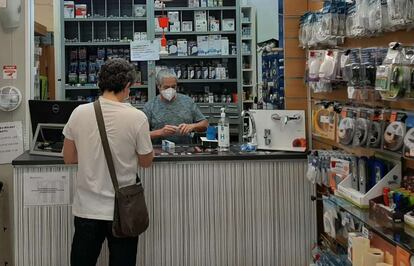Daily coronavirus deaths in Spain remain under 200
For the first time since the state of alarm, three Spanish regions have recorded no Covid-19 fatalities. Meanwhile, small businesses have reopened as part of the growing relaxation of confinement measures
Official figures from the Health Ministry released on Monday showed that there were 164 coronavirus-related fatalities in the last 24 hours, the same number as were reported on Sunday, and in keeping with the falling trend of recent weeks.
The number should, however, be viewed with some caution given that since the crisis began there has been underreporting of the data on weekends and also when there are holidays. May 1 was a holiday in all of Spain, as was May 2 in the Madrid region.
According to the latest data, there were 356 new infections as confirmed by the more reliable PCR tests, compared to 838 on Sunday. This represents a rise of 0.16% of the total. Since the crisis began, there have been a total of 218,011 infections in Spain confirmed by PCR tests, while 121,343 patients have recovered. The number of daily hospital admissions fell to 394 on Monday, down from the 547 reported yesterday.
We have to be clear that the risk of a new outbreak has not been eliminatedFernando Simón, director of the Health Ministry’s Coordination Center for Health Alerts and Emergencies
The total number of official coronavirus-related deaths in Spain now stands at 25,428.
For the first time since the state of alarm was declared on March 14, three Spanish regions – Valencia, Murcia and the Balearic Islands – have recorded no coronavirus fatalities. Several regions, as well as the exclave cities of Melilla and Ceuta in North Africa, also reported no intensive care admissions in the past 24 hours.
Over the past two weeks, the contagion rate in six regions, as well as Melilla and Ceuta, has fallen to under 28 cases per 100,000 inhabitants.
Speaking at the government’s daily press conference on Monday, Fernando Simón, the director of the Health Ministry’s Coordination Center for Health Alerts and Emergencies, said “the figures are good, but we have to be cautious after a long weekend. We have to be clear that the risk of a new outbreak has not been eliminated.”
On Saturday, adults in Spain were allowed to go outside for a walk or for exercise as part of the deescalation of the coronavirus confinement measures. The scenes of pedestrians, cyclists and runners out on the streets raised concern that the country could face a new spike in cases. “It is a question that involves us all. Every one of us has an important responsibility,” said Simón, in reference to the need to respect strict safety measures.
The health official added that 10 of Spain’s 17 regions recorded fewer than 10 hospital admissions, 14 had fewer than two intensive care admissions, and eight had fewer than two coronavirus fatalities.
Small businesses
Small businesses in Spain reopened on Monday as part of a gradual relaxation of confinement measures. Most of the country except for four islands remains on Phase 0 of the government’s deescalation plan. Under this phase, small businesses such as bookshops, hardware stores and auto repair shops are able to accept customers who make an appointment, with one customer permitted per employee, and special timetables for seniors.

The BoliBloc bookshop, near the famous Sagrada Familia Basilica in Barcelona, opened on Monday to a waiting list of customers, and passers-by also stopped by to make purchases. Anna Solà, the owner of the store, said she was not sure whether she could attend to the latter, but explained: “I am selling to whoever comes by, but I only accept card payments.”
Pedro Sola opened his electrics store Eléctrica Minerva, located in the Barcelona neighborhood of Clot, for the first time in six weeks. He said that he has been selling “batteries, light bulbs and internet cables.” Sola complained that he was not able to open his store during lockdown. “With people at home, things break. I have been missed by customers just as much as they have missed me.”

In the eastern region of Valencia, hairdresser María José said her salon, Les Tissores de Mapari, has been booked up for the entire week. “The truth is I can’t complain,” she said. “But it’s also true that it is harder to attend to clients one by one.” Since the coronavirus confinement measures were introduced in mid-March, María José has only attended to two senior customers in their homes.
On Monday, the Spanish islands of Formentera, El Hierro, La Graciosa and La Gomera moved directly to Phase 1, which allows sidewalk cafes to open at 50% capacity, and social gatherings of up to 10 people.
Opposition to extending state of alarm
The leader of the Popular Party (PP), Pablo Casado, said in a radio interview on Monday morning that “extending the state of alarm beyond 60 days does not make any sense.” The state of alarm, declared on March 14 in a bid to control the coronavirus outbreak, must be approved by Congress every two weeks, and the current period is set to end on May 9.
Prime Minister Pedro Sánchez, who heads a minority coalition government with junior partner Unidas Podemos, will need the support of other groups, such as the PP, if he is to secure the required votes in Spain’s lower house of parliament on Wednesday for a further two weeks of the state of alarm. The prime minister is expected to call the PP leader on Monday to ask for his support.
Casado did not confirm how his party would vote, but said in the interview: “Today, with the information that we have, we cannot support this extension [of the state of alarm].” If the PP abstains from the vote, instead of voting in favor, the measure would still be able to pass.
The news comes after several regional leaders told Sánchez on Sunday that they also opposed another extension of the state of alarm. Health Minister Salvador Illa said on Monday that extending the state of alarm was “imperative” to the deescalation of coronavirus confinement measures. “The state of alarm is a constitutional tool that has shown it works effectively. That is why the average rise [in infection rate] has fallen from 35% to 0.16%,” he said. “As health minister, I am telling you it is better not to experiment with what could lead us to chaos.”
English version by Melissa Kitson.
Tu suscripción se está usando en otro dispositivo
¿Quieres añadir otro usuario a tu suscripción?
Si continúas leyendo en este dispositivo, no se podrá leer en el otro.
FlechaTu suscripción se está usando en otro dispositivo y solo puedes acceder a EL PAÍS desde un dispositivo a la vez.
Si quieres compartir tu cuenta, cambia tu suscripción a la modalidad Premium, así podrás añadir otro usuario. Cada uno accederá con su propia cuenta de email, lo que os permitirá personalizar vuestra experiencia en EL PAÍS.
¿Tienes una suscripción de empresa? Accede aquí para contratar más cuentas.
En el caso de no saber quién está usando tu cuenta, te recomendamos cambiar tu contraseña aquí.
Si decides continuar compartiendo tu cuenta, este mensaje se mostrará en tu dispositivo y en el de la otra persona que está usando tu cuenta de forma indefinida, afectando a tu experiencia de lectura. Puedes consultar aquí los términos y condiciones de la suscripción digital.








































